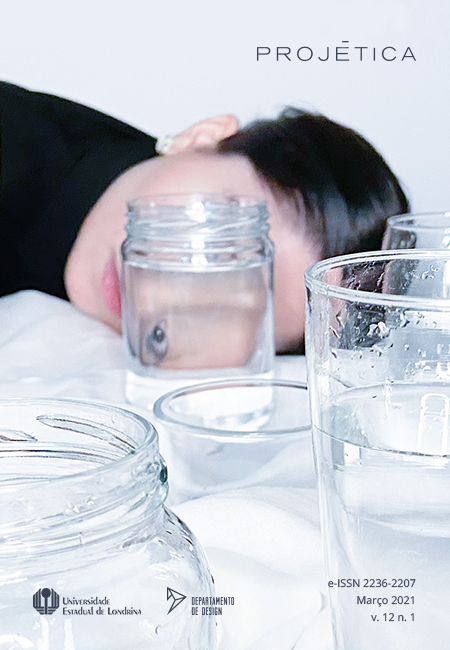Olfactive aesthetic experience within the servicescape: the olfactive aesthetic experience as means to provide a new perception of the servicescape
DOI:
https://doi.org/10.5433/2236-2207.2021v12n1p67Keywords:
Aesthetics of Odors, Servicescape, Aesthetic Experience, Affective Aspects, AtmosphereAbstract
From the points of view of Service Design, Services, Marketing and Communication, the odors can contribute to the provision of a given unit of satisfaction to the users of the service offered in a certain servicescape, with the potential to intervene in affective aspects. The specialized literature pointed to a gap on the Aesthetic dimension of Services, including the aesthetics of the odors. In this context, the problem that guided this research was based on the following question: how to use the olfactive aesthetic experience to provide a new perception of the servicescape by the user/client? The objective was to identify the relevant aspects of the olfactive aesthetic experience as a means to provide a new perception of the users/clients regarding the servicescape. The research has an exploratory and qualitative nature, with the application of a bibliographic review and a survey. Results show that the olfactive emotional aspects evoked in a servicescape have the potential to create and reinforce both positive and negative moods in users.Downloads
References
BAKER, Julie; GREWAL, Dhruv; PARASURAMAN, Ananthanarayanan. The influence of store environment on quality inferences and store image. Journal of the Academy of Marketing Science, v. 22, Ruston, LA, n. 4, p. 328-339, 1994.
BELLIZZI, Joseph A.; CROWLEY, Ayn E.; HASTY, Ronald W. The effects of color in store design. Journal of Retailing, Oxford, v. 59, n. 1, p. 21-25, 1983.
BITNER, Mary Jo. Servicescapes: the impact of physical surroundings on customers and employees. Journal of Marketing, Chicago, IL, v. 56, n. 2, p. 57-71, 1992.
CHEBAT, Jean-Charles; MICHON, Richard. Impact of ambient odors on mall shoppers' emotions, cognition, and spending: a test of competitive causal theories. Journal of Business Research, Amsterdam, v. 56, n. 7, p. 529-539, 2003.
CHREA, Christelle; GRANDJEAN, Didier; DELPLANQUE, Sylvain; CAYEUX, Isabelle; LE CALVÉ, Bénédicte; AYMARD, Laurence; SANDER, David; VELAZCO, Maria Inés; SCHERER, Klaus R. Mapping the semantic space for the subjective experience of emotional responses to odors. Chemical Senses, Oxford, v. 34, n. 1, p. 49-62, Jan. 2009.
CHU, Simon. Olfactory conditioning of positive performance in humans. Chem Senses. v. 33, p. 65-71, 2008.
CHU, Simon; DOWNES, John J. Odour-evoked autobiographical memories: psychological investigations of Proustian phenomena. Chemical Senses, Oxford, v. 25, n. 1, p. 111-116, 2000.
COSTA, Humberto. Design para serviços e consistência estética: proposição de um protocolo de avaliação estética em serviços. 2017. Tese (Doutorado em Design) - Universidade Federal do Paraná, Curitiba, 2017.
COSTA, Humberto; SANTOS, Aguinaldo. The dimension of services at PSS: evaluating the olfative experience within the servicescape. In: INTERNATIONAL SEMINAR ON SUSTAINABLE PRODUCT-SERVICE SYSTEMS AND DISTRIBUTED ECONOMY, 1., 2016, Curitiba, PR. Conference paper [...]. Curitiba: UFPR, 2016. p. 40-46.
ERDEM, Orhan; OUMLIL, Ben; TUNCALP, Secil. Consumer values and the importance of store attributes. International Journal of Retail & Distribution Management, Bingley, UK, v. 27, n. 4, p. 137-144, 1999.
FARKAS, Fátima Leão. Marketing olfativo: guia para aromatização de ambientes. São Paulo: Editora SENAC, 2013.
FREIRE, Karine de Mello. Design de serviços, comunicação e inovação social. 2011. Tese (Doutorado em Artes e Design) - Pontifícia Universidade Católica do Rio de Janeiro, Rio de Janeiro, RJ, 2011.
HERZ, Rachel S.; ELIASSEN, James; BELAND, Sophia; SOUZA, Timothy. Neuroimaging evidence for the emotional potency of odor-evoked memory. Neuropsychologia, Oxford, v. 42, n. 3, p. 371-378, 2004.
HEUBERGER, Eva; HONGRATANAWORAKIT, Tapanee; BÖHM, Carina; WEBER, Ruth; BUCHBAUER, Gerhard. Effects of chiral fragrances on human autonomic nervous system parameters and self-evaluation. Chemical Senses, Oxford, v. 26, n. 3, p. 281-292, 2001
ILMBERGER, Josef; HEUBERGER, Eva; MAHRHOFER, Claudia; DESSOVIC, Heidrun; KOWARIK, Dietlinde; BUCHBAUER, Gerhard. The influence of essential oils on human attention. I: Alertness. Chemical Senses, Oxford, v. 26, n. 3, p. 239-245, 2001.
KOTLER, Philip. Atmospherics as a marketing tool. Journal of Retailing, Oxford, v. 49, n. 4, p. 48-64, 1973.
LIPOVETSKY, Gilles. A felicidade paradoxal: ensaio sobre a sociedade de hiperconsumo. São Paulo: Editora Companhia das letras, 2007.
MAGER, Birgit. Service design. In: ERLHOFF, Michael; MARSHALL, Timothy (ed.). Design dictionary: perspectives on design terminology. Boston: Birkhäuser, 2007. p. 465.
MCGINLEY, Charles M.; MCGINLEY, Michael A. Odor testing bio solids for decision-making. Proceedings of the Water Environment Federation, Alexandria, VA, v. 2002, n. 3, p. 1055-1072, 2002. Available at: http://www.fivesenses.com/Documents/Library/37%20Odor%20Testing%20Bios-olids%20for%20 Decision%20Making.pdf. Acess in: 12 jan. 2015.
MCGOLDRICK, Peter J.; PIEROS, Christos P. Atmospherics, pleasure and arousal: the influence of response moderators. Journal of Marketing Management, Helensburgh, v. 14, n. 1-3, p. 173-197, 1998.
MILLOT, Jean-Louis. Effets des odeurs sur les comportements ou l'homme mené par le bout du nez. In: BOISSY, Alain; BAUDOIN, Claude; PHAM-DELÈGUE, Minh-Hà. (ed.). Éthologie appliquée. Comportements animaux et humains, questions de société. Paris: Éditions Quæ: Synthèse, 2009. p. 201-208.
MORITZ, Stefan. Service design: practical access to an evolving field. Cologne: Köln International School of Design, Cologne University of Applied Sciences, 2005.
NORMAN, Donald Arthur. Design emocional. Rio de Janeiro: Rocco, 2008.
PHILLIPS, Mary L.; HEINING, Maike. Neural correlates of emotion perception: from faces to taste. In: ROUBY, Catherine; SCHAAL, Benoist; DUBOIS, Danièle; GERVAIS, Rémi (ed.). Olfaction, taste, and cognition. Cambridge: Cambridge University Press, 2002. p. 196-208.
PÖSSEL, Patrick; AHRENS, Sergio; HAUTZINGER, Martin. Influence of cosmetics on emotional, autonomous, endocrinological, and immune reactions. International Journal of Cosmetic Science, Oxford, v. 27, n. 6, p. 343- 349, 2005.
PUCCINELLI, Nancy; GOODSTEIN, Ronald C.; GREWAL, Dhruv; PRICE, Robert, PRIYA RAGHUBIR, David. Customer experience management in retailing: understanding the buying process. Journal of Retailing, Oxford, v. 85, n. 1, p. 15-30, 2009.
RÉTIVEAU, Annlyse; CHAMBERS IV, Edgar; Mıllıken, George A. Common and specıfıc effects of fıne fragrances on the mood of women. Journal of Sensory Studies, Hoboken, NJ, v. 19, n. 5, p. 373-394, 2004.
ROYET, Jean-P.; PLAILLY, Jane; DELON-MARTIN, Chantal; KAREKEN, David A.; SEGEBARTH, Christoph. fMRI of emotional responses to odors: influence of hedonic valence and judgment, handedness, and gender. NeuroImage, Orlando, FL, v. 20, n. 2, p. 713-728, 2003.
Downloads
Published
How to Cite
Issue
Section
License
Copyright (c) 2021 Projetica

This work is licensed under a Creative Commons Attribution 4.0 International License.
Projética está licenciada sob a Creative Commons Attribution CC-BY 4.0 International. Os autores detém os direitos autorais e concedem à revista o direito de exclusividade de primeira publicação.
Os autores dos trabalhos aprovados autorizam Projética a, após a publicação, ceder seu conteúdo para reprodução em indexadores de conteúdo, bibliotecas virtuais e similares.
Os autores assumem que os textos submetidos à publicação são de sua criação original, responsabilizando-se inteiramente por seu conteúdo em caso de eventual impugnação por parte de terceiros. As opiniões emitidas pelos autores dos artigos são de sua exclusiva responsabilidade.
A revista se reserva o direito de efetuar, nos originais, alterações de ordem normativa, ortográfica e gramatical, com vistas a manter o padrão culto da língua e a credibilidade do veículo. Respeitará, no entanto, o estilo de escrever dos autores. Alterações, correções ou sugestões de ordem conceitual serão encaminhadas aos autores, quando necessário. Nesses casos, os artigos, depois de adequados, deverão ser submetidos a nova apreciação. As provas finais não serão encaminhadas aos autores.












